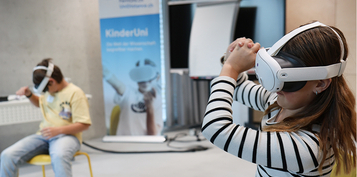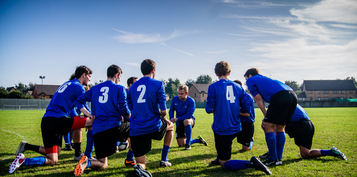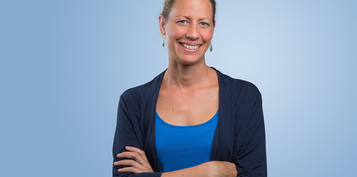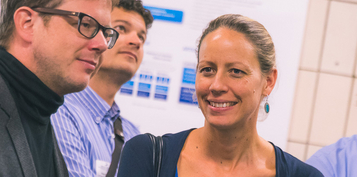Prof. Dr Corinna Martarelli

Corinna Martarelli is an Associate Professor at UniDistance Suisse. In her activity, she teaches three subjects in the Faculty of Psychology and also works on various research projects.
News


A unique handbook: The Routledge International Handbook of Boredom

New publication in Sport, Exercise, and Performance Psychology

Publication in European Journal of Psychological Assessment

Article on the validation of a single item measure of self-control
Publications
Martarelli, C. S., Rewitz, K., & Wolff, W. (2026). An analysis of the associations between boredom, effort value, and exercise behavior. Performance Enhancement & Health.
Radtke, V., Wolff, W., & Martarelli, C. S. (2025). How effortful is boredom? Studying self-control demands through pupillometry. Collabra.
Radtke, V., Martarelli, C. S., & Wolff, W. (2025). Task-related effort – Distinguishing boredom- and difficulty-related effort via electrodermal activity. Physiology & Behavior.
Wolff, W., Özay Otgonbayar, S., Danckert, J., Bieleke, M., & Martarelli, C. S. (2025). Effort and boredom shape our experience of time. Neuroscience and Biobehavioral Reviews.
Schnyder, S., Dall'Olio, L., Dubach, J., Tempelmann, S., Cacchione, T., & Martarelli, C. S. (2025). Are primary schools ready for immersive virtual reality? Resistance among stakeholders. Humanities and Social Sciences Communications.
Lapteva, A., Schnyder, S., Wolff, W., & Martarelli, C. S. (2025). Bore me (not): Boredom impairs recognition memory but not the pupil old/new effect. Quarterly Journal of Experimental Psychology.
Martarelli, C. S., & Mast, F. W. (2025). The long-lasting legacy of early experimental studies in visual mental imagery. Journal of Experimental Psychology: Human Perception and Performance, 51(3), 300–302.
Holgado, D., Cailleux, A., Ruggeri, P., Martarelli, C. S., Bekinschtein, T. A., Sanabria, D., & Place, N. (2025). Individualized cognitive effort to failure does not impact subsequent strenuous physical performance. Medicine & Science in Sports & Exercise.
Martarelli, C. S., Dubach, J., Schelleis, N., Cacchione, T., & Tempelmann, S. (2025). Virtual reality in primary science education: Improving knowledge of the water cycle. Educational Technology Research and Development.
Bieleke, M., Wolff, W., & Martarelli, C. S. (Eds.). (2024). The Routledge International Handbook of Boredom. Routledge.
Bieleke, M., Wolff, W., & Martarelli C.S. (2024). Boredom is not boring: From everyday experience to a powerful signal and beyond. In M. Bieleke, W. Wolff & C. S. Martarelli (Eds.), The Routledge International Handbook of Boredom. Routledge.
Bieleke, M., Wolff, W., Martarelli C.S., et al. 2024). Overview of current directions in boredom research. In M. Bieleke, W. Wolff & C. S. Martarelli (Eds.), The Routledge International Handbook of Boredom. Routledge.
Martarelli, C. S., & Baillifard, A. (2024). Mind-wandering as an exploratory response to boredom. In M. Bieleke, W. Wolff & C. S. Martarelli (Eds.), The Routledge International Handbook of Boredom. Routledge.
Martarelli, C. S., & Jost, N. S. (2024). Methodological approaches to boredom and its measurement. In M. Bieleke, W. Wolff & C. S. Martarelli (Eds.), The Routledge International Handbook of Boredom. Routledge.
Wolff, W., Radtke, V. C., & Martarelli, C. S. (2024). Same same but different – What is boredom actually? In M. Bieleke, W. Wolff & C. S. Martarelli (Eds.), The Routledge International Handbook of Boredom. Routledge.
Lapteva, A., & Martarelli, C. S. (2024). Pupil old/new effect as an objective measure of recognition memory: A meta-analysis of 17 eye-tracking experiments. Memory, 1–16.
Baillifard, A., Ertz, O., Lecorney, S., & Martarelli, C. S. (2024). Mythes écologiques du numérique [Chronique]. Formation et Profession, 32(1), 1-5.
Baillifard, A., Gabella, M., Lavenex, P. B., & Martarelli, C. S. (2024). Effective learning with a personal AI tutor: A case study. Education and Information Technologies.
Martarelli, C. S., Weibel, D., Popic, D., & Wolff, W. (2024). Time in suspense: Investigating boredom and related states in a virtual waiting room. Cognition and Emotion.
Meier, M., Martarelli, C. S., & Wolff, W. (2024). Is boredom a source of noise and/or a confound in behavioral science research? Humanities and Social Sciences Communications, 11, 368.
Dall'Olio, L., Amrein, O., Gianettoni, L., & Martarelli, C. S. (2024). The impact of fantasy on young children’s recall: A virtual reality approach. Virtual Reality.
Ovalle-Fresa R., & Martarelli, C. S. (2024). Drawing is an efficient encoding tool in younger but not always in older adults: The case of associative memory. Memory & Cognition.
Martarelli, C. S., & Ovalle-Fresa, R. (2024). In sight out of mind? Disengagement at encoding gradually reduces recall of location. Quarterly Journal of Experimental Psychology, 77, 42-56.
Martarelli, C. S., Chiquet, S., & Ertl, M. (2023). Keeping track of reality: Embedding visual memory in natural behavior. Memory, 31, 1295-1305.
Wolff, W., Bieleke, M., & Martarelli, C. S. (2023). Boredom, performance & health. Performance Enhancement & Health, 11(3), 100252.
Martarelli, C. S., Baillifard, A., Audrin, C. (2023). A trait-based network perspective on the validation of the French Short Boredom Proneness Scale. European Journal of Psychological Assessment, 39, 390-399.
Martarelli, C. S., Berthouzoz, P., Bieleke, M., & Wolff, W. (2023). Bored of sports? Investigating the interactive role of engagement and value as predictors of boredom in athletic training. Sport, Exercise, and Performance Psychology, 12(2), 141–154.
Bieleke, M., Martarelli, C. S., & Wolff, W. (2023). If-then planning, self-control, and boredom as predictors of adherence to social distancing guidelines: Evidence from a two-wave longitudinal study with a behavioral intervention. Current Psychology, 42, 9095-9108
Chiquet, S., Martarelli, C.S., Weibel, D., & Mast, F.W. (2023). Learning by teaching in immersive virtual reality – Absorption tendency increases learning outcomes. Learning and Instruction, 84, 101716.
Martarelli, C. S., Ovalle-Fresa, R., Popic, D., Globig, L. K., & Rothen, N. (2022). Reinstating location improves mnemonic access but not fidelity of visual mental representations. Cortex, 156, 39-53.
Chiquet, S., Martarelli, C.S., & Mast, F.W. (2022). Imagery-related eye movements in 3D space depend on individual differences in visual object imagery. Scientific Reports, 12, 14136.
Baillifard, A., & Martarelli, C. S. (2022). Notes et taux de décrochage inébranlables durant la Covid-19 en enseignement universitaire à distance. Savoirs, 60.
Wolff, W., Bieleke, M., Englert, C., Bertrams, A., Schüler, J., & Martarelli, C. S. (2022). A single item measure of self-control – Validation and location in a nomological network of self-control, boredom, and if-then planning. Social Psychological Bulletin, 17, 1-22.
Baillifard, A. & Martarelli, C. (2022). Oui à l’ennui [Chronique]. Formation et Profession, 30.
Martarelli, C. S., & Mast, F. W. (2022). Pictorial low-level features in mental images: Evidence from eye fixations. Psychological Research, 86, 350-363.
Dubach, J., Schelleis, N., Bölsterli, K., Cacchione, T., Martarelli, C. S., Probst, M., & Tempelmann, S. (2022). Unzugängliche Welten für das erfahrungsbasierte Lernen erschließen. Immersive Virtuelle Realität im naturwissenschaftlichen Sachunterricht. In: Sachunterricht in der Informationsgesellschaft. Bad Heilbrunn: Verlag Julius Klinkhardt, S. 147-154.
Martarelli, C. S., Bertrams, A., & Wolff, W. (2021). A Personality trait-based network of boredom, spontaneous and deliberate mind-wandering. Assessment, 28, 1915–1931.
Martarelli, C. S., Pacozzi, S. G., Bieleke, M., & Wolff, W. (2021). High trait self-control and low boredom proneness help COVID-19 homeschoolers. Frontiers in Psychology, 12:594256.
Martarelli, C. S., Wolff, W., & Bieleke, M. (2021). Bored by bothering? A cost-value approach to pandemic boredom. Humanities and Social Sciences Communication, 8.
Chiquet, S., Martarelli, C.S., & Mast, F.W. (2021). Eye movements to absent objects during mental imagery and visual memory in immersive virtual reality. Virtual Reality, 25, 655-667.
Hartmann, M., Martarelli, C. S., & Sommer, N. R. (2021). Early is left and up: Saccadic responses reveal horizontal and vertical spatial associations of serial order in working memory. Cognition, 217.
Jost, N. S., Jossen, S. L., Rothen, N., & Martarelli, C. S. (2021). The advantage of distributed practice in a blended learning setting. Education and Information Technologies, 26, 3097-3113.
Umar, H., Mast, F. W., Cacchione, T., & Martarelli, C. S. (2021). The prioritization of visuo-spatial associations during mental imagery. Cognitive Processing, 22, 227-237.
Wolff, W., Bieleke, M., Martarelli, C.S., & Danckert J. (2021). A primer on the role of boredom in self-controlled sports and exercise behavior. Frontiers in Psychology, 12:637839.
Wolff, W., & Martarelli, C. S. (2020). Bored into depletion? Towards a tentative integration of perceived self-control exertion and boredom as guiding signals for goal-directed behavior. Perspectives on Psychological Science, 15, 1272-1283.
Popic, D., Pacozzi S. G., & Martarelli, C. S. (2020). Database of virtual objects to be used in psychological research. PLOS ONE, 15: e0238041.
Hartmann, M., Martarelli, C. S., Reber, T. P., & Rothen, N. (2020). Does a smartphone on the desk drain our brain? No evidence of cognitive costs due to smartphone presence in a short-term and prospective memory task. Consciousness and Cognition, 86.
Martarelli, C. S., & Wolff, W. (2020). Too bored to bother? Boredom as a potential threat to the efficacy of pandemic containment measures. Humanities and Social Sciences Communications, 7.
Wolff, W., Martarelli, C. S., Schüler, J., & Bieleke, M. (2020). High boredom proneness and low trait self-control impair adherence to social distancing guidelines during the COVID-19 pandemic. International Journal of Environmental Research and Public Health, 17, 5420.
Globig, L. K., Hartmann, M., & Martarelli, C. S. (2019). Vertical head movements influence memory performance for words with emotional content. Frontiers in Psychology, 10: 672.
Englert, C., Koroma, D., Bertrams, A., & Martarelli, C. S. (2019). Testing the validity of the attention control video: An eye-tracking approach of the ego depletion effect. PLOS ONE,14: e0211181.
Martarelli, C. S. (2019). On the link between phenomenal causality and personality dominance. Cognitive Processing, 20, 117-123.
Martarelli, C. S., Feurer, E., Dapp, L. C. & Roebers, C. M. (2018). Profiles of executive functions and social skills in the transition to school: A person-centred approach. Infant and Child Development, 27: e2114.
Weibel, D., Martarelli, C. S., Häberli, D., & Mast, F. W. (2018). The fantasy questionnaire: A measure to assess imaginative and creative fantasy. Journal of Personality Assessment, 100, 431-443.
Martarelli, C. S., Chiquet, S., Laeng, B., & Mast, F. W. (2017). Using space to represent categories: Insights from gaze position. Psychological Research, 81, 721-729.
Martarelli, C. S., Mast, F. W., & Hartmann, M. (2017). Time in the eye of the beholder: Gaze position reveals spatial-temporal associations during encoding and memory retrieval of future and past. Memory & Cognition, 45, 40-48.
Martarelli, C. S., Mayer, B. & Mast, F. W. (2016). Daydreams and trait affect: The role of the listener’s state of mind in the emotional response to music. Consciousness and Cognition, 46, 27-35.
Wantz, A. L., Martarelli, C. S., Cazzoli, D., Kalla, R., Müri, R., & Mast, F. W. (2016). Disrupting frontal eye-field activity impairs memory recall. NeuroReport, 27, 374-378.
Wantz, A. L., Martarelli, C. S., & Mast, F. W. (2016). When looking back to nothing goes back to nothing. Cognitive Processing, 17, 105-114.
Stocker, K., Hartmann, M., Martarelli, C. S., & Mast, F. W. (2016). Eye movements reveal mental scanning through time. Cognitive Science, 40, 1648-1670.
Martarelli, C. S., Mast, F. W., Läge, D., & Roebers, C. M. (2015). The distinction between real and fictional worlds: Investigating individual differences in fantasy understanding. Cognitive Development, 36, 111-126.
Martarelli, C. S., Borter, N., Bryjova, J., Mast, F. W., & Munsch, S. (2015). The influence of parent's body mass index on peer selection: An experimental approach using virtual reality. Psychiatry Research, 230, 5-12.
Martarelli, C. S., Gurtner, L. M., & Mast, F. W. (2015). School-age children show a bias toward fantasy classifications after playing platform games. Psychology of Popular Media Culture, 4, 351-359.
Hartmann, M., Martarelli, C. S., Mast, F. W., & Stocker, K. (2014). Eye movements during mental time travel follow a diagonal line. Consciousness and Cognition, 30, 201-209.
Martarelli, C. S., & Mast, F. W. (2013). Eye movements during long-term pictorial recall. Psychological Research, 77, 303-309.
Martarelli, C. S., & Mast, F. W. (2013). Is it real or is it fiction? Children’s bias toward reality. Journal of Cognition and Development, 14, 141-153.
Martarelli, C. S., & Mast, F. W. (2011). Preschool children’s eye movements during pictorial recall. British Journal of Developmental Psychology, 29, 425-436.
Canevascini, M., Martarelli, C. S., & Lettieri, K. (2008). Évaluation d'une association régionale de prévention du suicide en Suisse, Santé Publique, 20, 275-284.
Research focus
Memory, learning, mental imagery
Psychological aspects related to performance
Boredom, mind-wandering, effort
Lifespan
Virtual reality
Research projects
Research groups
Methodology and Statistics
Faculty of Psychology
- Corinna Martarelli
- Katja Rewitz
- Wanja Wolff
- Vanessa Radtke
- Corinna Martarelli
- Wanja Wolff
- Vanessa Radtke
- Corinna Martarelli
- Wanja Wolff
- Vanessa Radtke
- Corinna Martarelli
- Wanja Wolff
- Vanessa Radtke
- Wanja Wolff
- Corinna Martarelli
- Corinna Martarelli
- pauline Berthouzoz
- Laura Rotheichner
- Dejan Popic
- Vanessa Radtke
- Wanja Wolff
- Corinna Martarelli
- Wanja Wolff
- Lukas Hack
- Israel Halperin
- Darias Holgado
- Chris Englert
- Astrid Zech
- Julia Schüler
- Maik Bieleke
- Amitai Shenhav
- Corinna Martarelli
- Corinna Martarelli
- Katja Rewitz
- Wanja Wolff
- Vanessa Radtke
- Wanja Wolff
- Corinna Martarelli
- Chiara Samatanga
- Alexandra Lapteva
- Wanja Wolff
- Corinna Martarelli
- Chiara Samatanga
- Alexandra Lapteva
- Wanja Wolff
- Corinna Martarelli
- Wanja Wolff
- Sena Özay-Otgonbayar
- James Danckert
- Maik Bieleke
- Corinna Martarelli
- Vanessa Radtke
- Wanja Wolff
- Corinna Martarelli
- Vanessa Radtke
- Corinna Martarelli
- Wanja Wolff
- pauline Berthouzoz
- Sandra Chiquet
- Corinna Martarelli
- Corinna Martarelli
- Katja Rewitz
- Wanja Wolff
- Wanja Wolff
- Sena Özay-Otgonbayar
- James Danckert
- Maik Bieleke
- Corinna Martarelli
- Vanessa Radtke
- Wanja Wolff
- Corinna Martarelli
- Alexandra Lapteva
- Sarah Schnyder
- Wanja Wolff
- Corinna Martarelli
- Matthias Hartmann
- Wanja Wolff
- Corinna Martarelli
- Matthias Hartmann
- Wanja Wolff
- Corinna Martarelli
- Vanessa Radtke
- Corinna Martarelli
- Wanja Wolff
- Lucas Dall'Olio
- Olivier Amrein
- Corinna Martarelli
- Wanja Wolff
- Sena Özay-Otgonbayar
- James Danckert
- Maik Bieleke
- Corinna Martarelli
- Wanja Wolff
- Sena Özay Otgonbayar
- James Danckert
- Maik Bieleke
- Corinna Martarelli
- pauline Berthouzoz
- Sandra Chiquet
- Corinna Martarelli
- Darias Holgado
- Alice Cailleux
- Paolo Ruggeri
- Corinna Martarelli
- Tristan Bekinschtein
- Daniel Sanabria
- Nicolas Place
- Maik Bieleke
- Wanja Wolff
- Corinna Martarelli
- Maik Bieleke
- Wanja Wolff
- Corinna Martarelli
- Alexandra Lapteva
- Corinna Martarelli
- Alexandra Lapteva
- Wanja Wolff
- Corinna Martarelli
- Alexandra Lapteva
- Sarah Schnyder
- Wanja Wolff
- Corinna Martarelli
- Vanessa Radtke
- Wanja Wolff
- Corinna Martarelli
- Vanessa Radtke
- Wanja Wolff
- Corinna Martarelli
- Corinna Martarelli
- David Weibel
- Dejan Popic
- Wanja Wolff
- Corinna Martarelli
- Sandra Chiquet
- Matthias Ertl
- Corinna Martarelli
- Josua Dubach
- Natalie Schelleis
- Trix Cacchione
- Sebastian Tempelmann
- Wanja Wolff
- Maik Bieleke
- Corinna Martarelli
- Lucas Dall'Olio
- Olivier Amrein
- Lavinia Gianettoni
- Corinna Martarelli
- Maria Meier
- Corinna Martarelli
- Wanja Wolff
- Corinna Martarelli
- Nathanael Jost
- Corinna Martarelli
- Ambroise Baillifard
- Wanja Wolff
- Vanessa C. Radtke
- Corinna Martarelli
- Rebecca Ovalle-Fresa
- Corinna Martarelli
- Corinna Martarelli
- pauline Berthouzoz
- Maik Bieleke
- Wanja Wolff
- Martarelli, Corinna S.
- Ovalle-Fresa, Rebecca
- Popic, Deian
- Globig, Laura K.
- Rothen, Nicolas
- Wanja Wolff
- Maik Bieleke
- Chris Englert
- Alex Bertrams
- Julia Schüler
- Corinna Martarelli
- Corinna Martarelli
- Ambroise Baillifard
- Catherine Audrin
- Corinna Martarelli
- Rebecca Ovalle-Fresa
- Corinna Martarelli
- Wanja Wolff
- Maik Bieleke
- Corinna Martarelli
- Rebecca Ovalle-Fresa
- Dejan Popic
- Laura K. Globig
- Nicolas Rothen
- Jost, Nathanael S.
- Jossen, Sina L.
- Rothen, Nicolas
- Martarelli, Corinna S.
- Wanja Wolff
- Maik Bieleke
- Corinna Martarelli
- James Danckert
- Corinna Martarelli
- Simona Pacozzi
- Maik Bieleke
- Wanja Wolff
- Dejan Popic
- Simona Pacozzi
- Corinna Martarelli
- Maik Bieleke
- Corinna Martarelli
- Wanja Wolff
- Corinna Martarelli
- Alex Bertrams
- Wanja Wolff
- Wanja Wolff
- Corinna Martarelli
- Julia Schüler
- Maik Bieleke
- Wanja Wolff
- Corinna Martarelli
- Corinna Martarelli
- Wanja Wolff
- Hartmann, Matthias
- Martarelli, Corinna S.
- Reber, Thomas P.
- Rothen, Nicolas
- Englert, C.
- Koroma, D.
- Bertrams, A.
- Martarelli, C.S.
- Martarelli, C.S.
- Michela Canevascini
- Corinna Martarelli
- Katia Lettieri
Teaching
| M04 |
Methoden II: Forschungsmethoden und Statistik II
Bachelor of Science in Psychology
|
| M13 |
Methoden V: Forschungsmethoden und Statistik III
Bachelor of Science in Psychology
|
| M2 |
Functions at UniDistance Suisse
Executive board
- Vice-Rector for Teaching
Faculty of Psychology
- Associate Professor
Faculty Council of the Faculty of Psychology
- Associate Professor
Methodology and Statistics
- Associate Professor
Academic Council
- Vice-Rector for Teaching
- Advisory Member
Teaching Vice-rectorate
- Vice-Rector for Teaching

